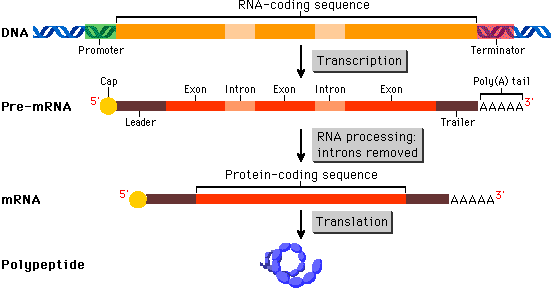Transcription of Protein-Coding Genes in Eukaryotes:
The Protein synthesis is very important because it is by the use of genetic information to synthesize proteins in which the genes in the DNA are expressed in the phenotype. Make sure you understand what actually proteins are and why they are so much important.
Protein synthesis included two big steps and various other smaller steps depending on the organism. The two big steps are known as translation and transcription. Transcription includes the synthesis of an RNA transcript using the cell's DNA as a template leading to mRNA (messenger RNA). In eukaryotic cells transcription happens in the nucleus. Once the messenger RNA is establish it then is transported to the cytoplasm where the information contained in the mRNA is translated into a sequence of amino acids making up a polypeptide.

The previous decade has seen an explosive raise in information about regulation of eukaryotic gene transcription, particularly for protein-coding genes. The most remarkable advances in our knowledge of transcriptional regulation include the chromatin template, the huge complexes recruited through transcriptional activators which regulate chromatin structure and the transcription apparatus and the holoenzyme forms of RNA polymerase II included in elongation and initiation, and the mechanisms which link mRNA processing with its synthesis. We define here the main advances in these fields, with particular emphasis on the modular complexes associated with RNA polymerase II which are targeted through activators and other regulators of mRNA biosynthesis.